典型高考英语陷阱题详解-比较结构
高考单选英语陷阱--结构误配型
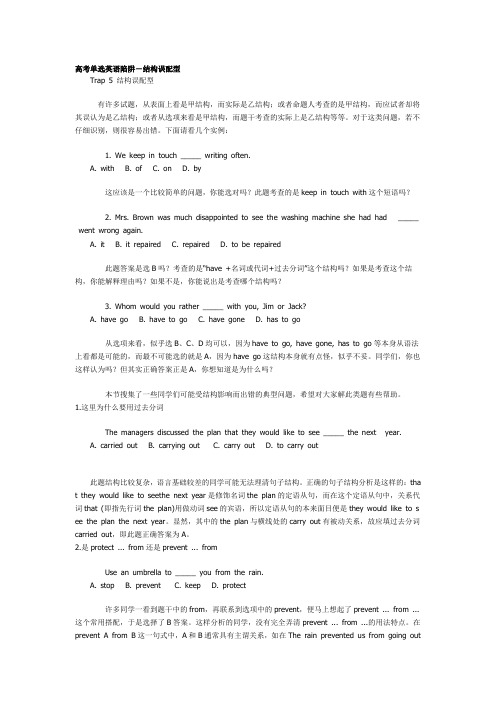
高考单选英语陷阱-结构误配型Trap 5 结构误配型有许多试题,从表面上看是甲结构,而实际是乙结构;或者命题人考查的是甲结构,而应试者却将其误认为是乙结构;或者从选项来看是甲结构,而题干考查的实际上是乙结构等等。
对于这类问题,若不仔细识别,则很容易出错。
下面请看几个实例:A. withB. ofC. on这应该是一个比较简单的问题,你能选对吗?此题考查的是keep in touch with这个短语吗?2. Mrs. Brown was much disappointed to see the washing machine she had had _____A. itB. it repairedC. repaired此题答案是选B吗?考查的是“have +名词或代词+过去分词”这个结构吗?如果是考查这个结构,你能解释理由吗?如果不是,你能说出是考查哪个结构吗?3. Whom would you rather _____ with you, Jim or Jack?A. have goB. have to goC. have gone从选项来看,似乎选B、C、D均可以,因为have to go, have gone, has to go等本身从语法上看都是可能的,而最不可能选的就是A,因为have go这结构本身就有点怪,似乎不妥。
同学们,你也这样认为吗?但其实正确答案正是A,你想知道是为什么吗?本节搜集了一些同学们可能受结构影响而出错的典型问题,希望对大家解此类题有些帮助。
1.这里为什么要用过去分词The managers discussed the plan that they would like to see _____ the nextA. carried out C. carry out此题结构比较复杂,语言基础较差的同学可能无法理清句子结构。
正确的句子结构分析是这样的:tha t they would like to seethe next year是修饰名词the plan的定语从句,而在这个定语从句中,关系代词that (即指先行词the plan)用做动词see的宾语,所以定语从句的本来面目便是they would like to s ee the plan the next year。
高考英语陷阱题归纳总结

高考英语陷阱题归纳总结高考英语作为一门重要科目,对于考生而言是一次重要的挑战。
在备考中,我们经常会遇到一些陷阱题,这些题目可能会导致我们的失分。
因此,本文将对高考英语中的陷阱题进行归纳总结,并提供策略来应对这些陷阱。
一、同义词替换陷阱在高考英语试题中,同义词替换是一种常见的陷阱形式。
考生在阅读理解和词汇填空题中常常会遇到这类问题。
这类题目常常会使用同义词替换原文中的关键词,以考查考生对词汇的掌握能力。
因此,我们需要通过广泛的阅读和积累词汇来增加自己对同义词的敏感性,从而更好地把握题意。
二、修饰语陷阱修饰语陷阱是一种常见的语法陷阱。
在选词填空、翻译和完形填空等题目中,我们经常会遇到修饰语陷阱。
这类题目常常通过对句子中修饰语的位置和形式进行调整,试图混淆考生对句子结构的理解。
因此,我们需要注意句子结构中修饰语的位置和作用,以避免被误导。
三、语境理解陷阱语境理解是高考英语试题中的难点之一。
考生在阅读理解和完形填空等题目中常常会遇到这类问题。
这类题目常常将重点放在考生对语篇整体的理解能力上,并试图通过迷惑性的选项来干扰考生的判断。
因此,我们需要通过多读多练的方式提高对语境的理解能力,以辨别正确答案。
四、逻辑推理陷阱逻辑推理是高考英语试题中的另一个难点。
在阅读理解和写作题中常常会涉及到逻辑推理。
这类题目试图考查考生对信息提取和推理能力的掌握程度。
因此,我们需要培养自己对信息的敏感性,通过积极阅读和思考来提高自己的逻辑推理能力。
五、易混淆词汇陷阱易混淆词汇是高考英语试题中的常见陷阱。
在选词填空和阅读理解等题目中,我们经常会遇到这类问题。
这类题目通过对词汇的选择和运用来考察考生的细致观察力。
因此,我们需要通过大量的练习和积累,加强对易混淆词汇的辨析能力,以避免被误导。
综上所述,高考英语陷阱题在考试中经常出现,对考生来说是一次重要的挑战。
通过了解和归纳这些陷阱的形式,我们可以有针对性地进行备考,提高应对陷阱题的能力。
高考英语陷阱题总结归纳—比较结构(附详解)

高考英语陷阱题总结归纳—比较结构(附详解)高考英语陷阱题总结归纳——比较结构◆典型陷阱题分析◆1. How beautifully she sings! I have never heard _____ voice.A. a betterB. a bestC. the betterD. the best【陷阱】容易误选D,认为最高级前要用定冠词。
【分析】其实此题最佳答案为A,该句可视为…I have never heard a better voice than her voice 之省略,全句句意为―她唱得多好啊!我从未听过她这么好的声音‖。
请再看以下类似的实例:He is fine, never better. 他很好,比以往任何时候都好。
This bird is really lovely. I‘ve never seen a finer one. 这只鸟真可爱,我从未见过这样好看的鸟。
比较以下试题,情形也大致相同:(1) ―I‘ve never found a better job.‖ ―_______.‖A. I don‘t think soB. Too badC. CongratulationsD. Do n‘t worry答案选C,I‘ve never found a better job可视为I‘ve never found a better job than this job 之省略,句意为:我从来没有找到比这份工作更好的工作,即这是我所找到的最好的工作。
(2) ―What do you think of the service here?‖ ―Oh, ______. We couldn‘t have found a better place.‖A. too badB. sorryC. wonderfulD. impossible答案选C。
We couldn‘t have found a better place 可视为We couldn‘t have found a better place than this place,其意为―我们不可能找到一个比这个地方更好的地方‖,即―这是我们所能找到的最好的地方‖。
高考英语单项填空陷阱题透析
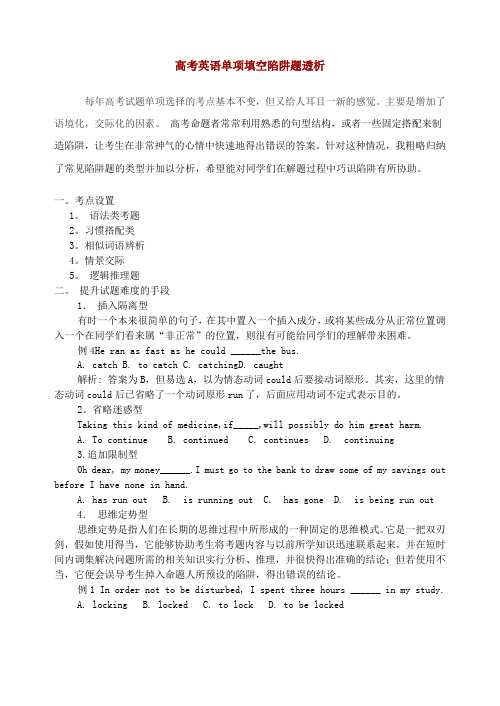
高考英语单项填空陷阱题透析每年高考试题单项选择的考点基本不变,但又给人耳目一新的感觉。
主要是增加了语境化,交际化的因素。
高考命题者常常利用熟悉的句型结构,或者一些固定搭配来制造陷阱,让考生在非常神气的心情中快速地得出错误的答案。
针对这种情况,我粗略归纳了常见陷阱题的类型并加以分析,希望能对同学们在解题过程中巧识陷阱有所协助。
一。
考点设置1。
语法类考题2。
习惯搭配类3。
相似词语辨析4。
情景交际5。
逻辑推理题二。
提升试题难度的手段1.插入隔离型有时一个本来很简单的句子,在其中置入一个插入成分,或将某些成分从正常位置调入一个在同学们看来属“非正常”的位置,则很有可能给同学们的理解带来困难。
例4He ran as fast as he could ______the bus.A. catchB. to catchC. catchingD. caught解析: 答案为B,但易选A,以为情态动词could后要接动词原形。
其实,这里的情态动词could后已省略了一个动词原形run了,后面应用动词不定式表示目的。
2。
省略迷惑型Taking this kind of medicine,if_____,will possibly do him great harm.A. To continueB. continuedC. continuesD. continuing3.追加限制型Oh dear, my money______.I must go to the bank to draw some of my savings out before I have none in hand.A. has run outB. is running outC. has goneD. is being run out4.思维定势型思维定势是指人们在长期的思维过程中所形成的一种固定的思维模式。
它是一把双刃剑,假如使用得当,它能够协助考生将考题内容与以前所学知识迅速联系起来,并在短时间内调集解决问题所需的相关知识实行分析、推理,并很快得出准确的结论;但若使用不当,它便会误导考生掉入命题人所预设的陷阱,得出错误的结论。
高考英语结构型典型陷阱题详解
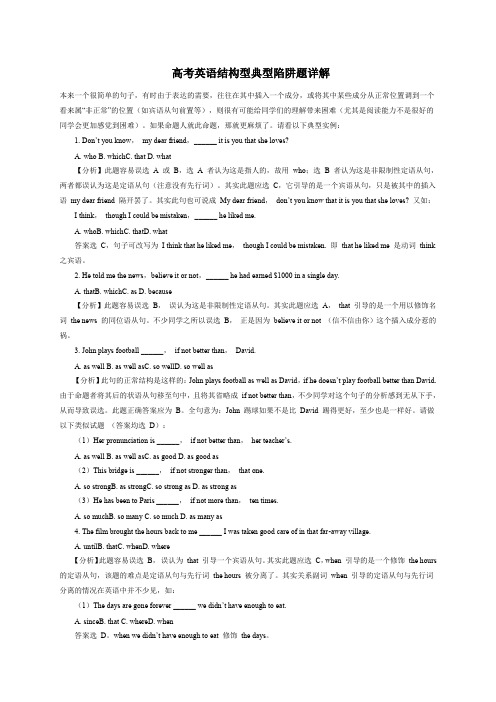
高考英语结构型典型陷阱题详解本来一个很简单的句子,有时由于表达的需要,往往在其中插入一个成分,或将其中某些成分从正常位置调到一个看来属“非正常”的位置(如宾语从句前置等),则很有可能给同学们的理解带来困难(尤其是阅读能力不是很好的同学会更加感觉到困难)。
如果命题人就此命题,那就更麻烦了。
请看以下典型实例:1. Don’t you know,my dear friend,______ it is you that she loves?A. whoB. whichC. thatD. what【分析】此题容易误选 A 或B,选 A 者认为这是指人的,故用who;选 B 者认为这是非限制性定语从句,两者都误认为这是定语从句(注意没有先行词)。
其实此题应选C,它引导的是一个宾语从句,只是被其中的插入语my dear friend 隔开罢了。
其实此句也可说成My dear friend,don’t you know that it is you that she loves? 又如:I think,though I could be mistaken,______ he liked me.A. whoB. whichC. thatD. what答案选C,句子可改写为I think that he liked me,though I could be mistaken. 即that he liked me 是动词think 之宾语。
2. He told me the news,believe it or not,______ he had earned $1000 in a single day.A. thatB. whichC. asD. because【分析】此题容易误选B,误认为这是非限制性定语从句。
其实此题应选A,that 引导的是一个用以修饰名词the news 的同位语从句。
不少同学之所以误选B,正是因为believe it or not (信不信由你)这个插入成分惹的祸。
高考英语典型“陷阱题”50例(含答案解析)1

同学们在平时做题的过程中有没有发现这样的现象:有些题⽬看起来似曾相识,轻⽽易举就可选出“正确答案”,结果往往发现⾃⼰错了。
这些题⽬就是我们所说的“陷阱题”。
它们看似简单,实则不易解答。
出题者往往设下“陷阱”,如果⼤家⽤固定的思维⽅式去考虑,就会误选答案。
近年来,⾼考试卷中也常有这种性质的试题出现。
当同学们遇到这种题时,既不可“轻易下⼿”,也不可不知所措,⽽应做到先三思⽽后⾏。
⾸先,同学们要认真审题,发现“陷阱”。
要灵活地运⽤语法规则,理顺思路,寻找“陷阱”。
其次,要运⽤多向思维,分析“陷阱”。
不要⽤习惯的、单⼀的、⽚⾯的思维去解题。
再次,要去伪存真,识别“陷阱”。
要抓住基本知识点及特殊现象,不厌其烦地归纳理解,认清选择题⽬中的“鱼⽬”及“珍珠”,避免落⼊“陷阱”。
最后就是要加强验证,跳出“陷阱”。
这就要求学习者要有良好的检查验证习惯,掌握验证的⽅法,即使落⼊了“陷阱”,也能在验证过程中,发现“陷阱”,并迅速地跳出来。
下⾯是—些⽐较典型的“陷阱题”.请⼤家做做看: 1. Mr Wang made up his mind to devote all he could ______ his oral English before going abroad.A. improveB. to improveC. improvingD. to improving 2. Everything he ______ away from him before he returned to his hometown.A. tookB. had been takenC. had had been takenD. had taken 3. Before he went abroad, he spent as much time as he _____ English.A. could learningB. learnedC. to learnD. could learn 4. You can never imagine what great difficuly I have ______ your house.A. foundB. findingC. to findD. for finding 5. The person we spoke to ______ no answer at first.A. makingB. makesC. makeD. made 6. The person we referred to ______ us a report tomorrow.A. givingB. will giveC. gaveD. give 7. The days we have been looking forward to _______ soon.A. comingB. will comeC. cameD. have come 8. The person we talked about ______ our school last week.A. visitingB. will visitC. visitedD. has visited 9. The man whose songs we are fond of ______ in our city next week.A. singingB. to singC. will singD. sang 10. Not only ______ the jewelry she _____ been sold for her son’s gambling debts but also her house.A. is; hasB. has; hadC. has; hasD. 不填; has 11. ______ in thought, he almost ran into the car in front of him.A. LosingB. Having lostC. LostD. To lose 12. The research is so designed that once nothing can be’ done to change it.A. beginsB. having begunC. beginningD. begun 13. — What do you think made the woman so upset? — _______ weight.A. As she put onB. Put onC. Putting onD. Because of putting on 14. Time should be made good use of ______ our lessons well.A. learningB. learnedC. to learnD. having learned 15. It was only with the help of the local guide ______. A. was the mountain climber rescued B. then the mountain climber was rescued C. when the mountain climber was rescued D. that the mountain climber was rescued 16. Never ______ time come again.A. has lostB. will loseC. will lostD. lose 17. — ______ was it ______ they discovered the entrance to the underground palace? — Totally by chance.A. What; thatB. How; thatC. When; howD. Where; that 18. I have nothing to confess. ______ you want me to say?A. What is it thatB. What it is whatC. How is it thatD. How it is that 19. Is this factory ______ you visited the other day?A. the oneB. thatC. whereD.when 20. Was it _____ she heard with her ears really made her frightened? A: what; that B. it; thatC. that; whichD. what;不填 21. ______ what the six blind men said sounded!A. How foolishlyB. How foolishC. What foolishlyD. What foolish 22. It was ______ the old clock that the old man spent the whole morning at home.A. repairB. repairingC. to repairD. in repair 23. Is this hotel ______ you said we were to stay in your letter?.A. thatB. whereC. the oneD. in which 24. Please tell me the way you thought of ______ the garden.A. take care ofB. to take care ofC. takinq care ofD. how to take care of 25. A fast-food restaurant is the place _______, just as the name suggests, eating is performed quickly.A. whichB. whereC. thereD. what 26. The film brought the hours back to me ______ I was taken good care of in that far-away village.A. untilB. thatC. whenD. where 27. The professor has written another book,________ of great importance to cornputer science.A. which I think it isB. and I think isC. which I think isD. when I think is 28. — Where do you think ______ he ______ the computer? — Sorry, I have no idea.A. had; boughtB. has; boughtC. did; buyD. 不填; bought 29. We should do more such exercises in the future, I think, _____ those we did yesterday.A. asB. likeC. aboutD. than 30. He will tell you _____ he expects will win such a match.A. whyB. whomC. whichD. who 31. In New Zealand, I made lots of friends _____ a very practical knowledge of the English language.A. getB. togetC. gettingD. got 32. I’m busy now. I’m sorry I can’t help _____ the flowers.A. watedngB. wateredC. watersD. to water 33. Who would you rather ______ the report instead of you?A. have writeB. have to writeC. writeD. have written 34. We must stop pollution ______ longer.A. livingB. from livingC. to liveD. live 35. — Was it under the tree ______ you were away talking to a friend? — Sure. But when I get back there, the bike was gone.A. thatB.whereC. whichD. while 36. Not far from the club there was a garden, ______ owner seated in it playing bridge with his children every aftemoon.A. whoseB. itsC. whichD. that 37. Wang Ling was elected ______ all he is the tallest.A. becauseB. because ofC. forD. as 38. We’ll be free tomorrow, so I suggest ______ to the history museum.A. to visitB. visitingC. we should visitD. a visit 39. I like swimming, while what my brother enjoys ______.A. cookingB. to cookC. is cookingD. cook 40. Thank you for the trouble you have ______ to help me.A. paidB. takenC. hadD. asked 41. Who is it up _______ decide whether to goor not?A. to toB. for forC. to forD. for to 42. We keep in touch ______ writing often.A. withB. ofC. onD. by 43. — How long have you been here? — ______ the end of last month,A. InB. ByC.AtD. Since 44. You should treat him (in) the way ______ suits him most.A. thatB. in whichC. 不填D. why 45. He insisted that the sky ______ clear up the following day.A. wouldB. shouldC. 不填D. be 46. He is a strict but kind-hearted father, ______ the children respect but are afraid of.A.不填B. thatC. for whomD. one whom 47. Mr Smith is ______ a good teacher ______ we all respect.A. such;thatB. such; as。
高考单选 “雷人题” 五十例解析
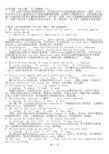
A. How foolishly B. How foolish
C. What foolishly D. What foolish
此题为感叹句。句中有系动词sound,它后面应接形容词。该句可改为:What the six blind men said sounded foolish. 故选B。
5. The person we spoke to ____ no answer at first.
A.making B.makes C.make D.made
此题中也包含一个定语从句we spoke to,the person既作先行词,又作句子的主语,要填入的应该是句子的谓语,根据句子的需要,应选过去时。本题中的to为陷阱,实际上它属于定语从句中,而不影响主句的谓语动词。故D正确。
A. took B. had been taken C. had had been taken D. had taken
此题应该首先把句子结构分析清楚。句中Everything既作句子的主语,又作先行词,后接定语从句(that) he had,而had been taken 是过去完成时的被动态作句子的谓语。此题的意思为“在他返回家乡之前,他所有的一切都被拿走了”。故选C。
17. —____ was it ____ they discovered the entrance to the underground palace?
—Totally by chance.
A. What, that B. How, that C. When, how D. Where, that
高考英语陷阱题经典分析

1.这个such...that中的that引导的是结果状语从句吗Mr. Smith is _____ a good teacher _____ we all respect.A. such, thatB. such, asC. so, thatD. so, as此题容易误选A,一方面是因为such ... that ...是同学们很熟悉的一个句式,一看就可能选中了;另一方面,将such ... that ...的意思“如此……以至……”代入句中,也完全通顺,即“史密斯先生是一位如此优秀的教师,以至我们大家都尊敬他”。
从表面上看,以上分析很有道理,但其实错了。
因为在such ... that ...结构中,that引导的是结果状语从句,并且that 在从句中不充当句子成分,若在上句填入such ... that ...,句末的respect显然缺少宾语(注意:respect是及物动词)。
正确的答案应是B,as用做关系代词,用以引导定语从句,修饰其前的名词teacher,同时as在定语从句中用做动词respect的宾语,句意为“史密斯先生是我们大家都尊敬的一位好老师”。
有的同学可能还会问,假若选A,能否将其后的that视为引导定语从句的关系代词呢?不能,因为当先行词受到such的修饰时,其后的定语从句应用关系代词as来引导,而不用that。
顺便说一句,假若在原句的respect后加上him一词,则应选A,即He is such a good teacher that we all respect him,他是如此好的一位老师,我们大家都尊敬他。
2. can't help后一定要接动名词吗She can't help _____ the house because she's busy making a cake.A. to cleanB. cleaningC. cleanedD. being cleaned此题容易误选B,简单地套用can't help doing sth这一结构。
高考英语考点典型精编陷阱题分析介词考点典型陷阱题分析
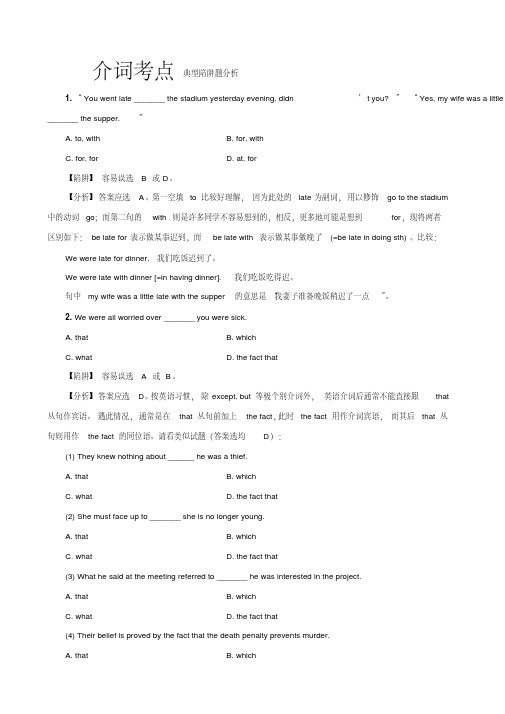
介词考点典型陷阱题分析1.“You went late _______ the stadium yesterday evening, didn’t you?”“Yes, my wife was a little _______ the supper.”A. to, withB. for, withC. for, forD. at, for【陷阱】容易误选 B 或D。
【分析】答案应选A。
第一空填to 比较好理解,因为此处的late为副词,用以修饰go to the stadium中的动词go;而第二句的with 则是许多同学不容易想到的,相反,更多地可能是想到for,现将两者区别如下:be late for表示做某事迟到,而be late with 表示做某事做晚了(=be late in doing sth)。
比较:We were late for dinner. 我们吃饭迟到了。
We were late with dinner [=in having dinner]. 我们吃饭吃得迟。
句中my wife was a little late with the supper 的意思是“我妻子准备晚饭稍迟了一点”。
2. We were all worried over _______ you were sick.A. thatB. whichC. whatD. the fact that【陷阱】容易误选 A 或B。
【分析】答案应选D。
按英语习惯,除except, but 等极个别介词外,英语介词后通常不能直接跟that从句作宾语。
遇此情况,通常是在that 从句前加上the fact,此时the fact 用作介词宾语,而其后that 从句则用作the fact 的同位语。
请看类似试题(答案选均D):(1) They knew nothing about ______ he was a thief.A. thatB. whichC. whatD. the fact that(2) She must face up to _______ she is no longer young.A. thatB. whichC. whatD. the fact that(3) What he said at the meeting referred to _______ he was interested in the project.A. thatB. whichC. whatD. the fact that(4) Their belief is proved by the fact that the death penalty prevents murder.A. thatB. whichC. whatD. the fact that(5) The writer is not satisfied with _______ buses are too crowded.A. thatB. whichC. whatD. the fact that3.Sometimes our opinions differ _______ what we choose to observe and how we deal with what weobservedA. whichB. sinceC. becauseD. because of【陷阱】容易误选C。
典型高考英语陷阱题详解
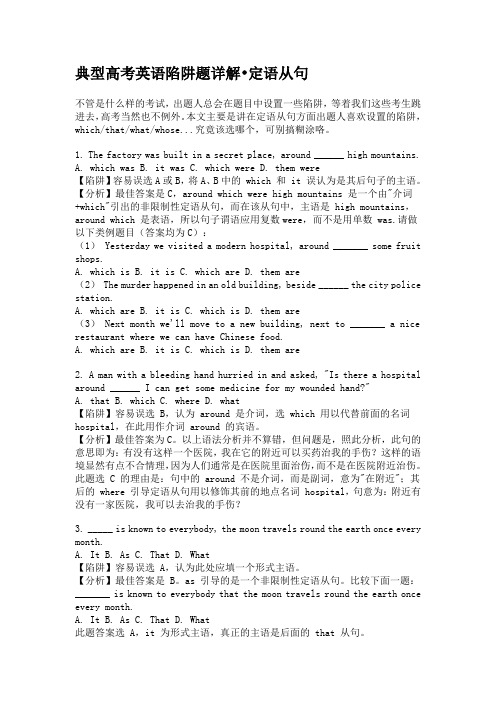
典型高考英语陷阱题详解•定语从句不管是什么样的考试,出题人总会在题目中设置一些陷阱,等着我们这些考生跳进去,高考当然也不例外。
本文主要是讲在定语从句方面出题人喜欢设置的陷阱,which/that/what/whose...究竟该选哪个,可别搞糊涂咯。
1. The factory was built in a secret place, around ______ high mountains.A. which wasB. it wasC. which wereD. them were【陷阱】容易误选A或B,将A、B中的 which 和 it 误认为是其后句子的主语。
【分析】最佳答案是C,around which were high mountains 是一个由"介词+which"引出的非限制性定语从句,而在该从句中,主语是 high mountains,around which 是表语,所以句子谓语应用复数were,而不是用单数 was.请做以下类例题目(答案均为C):(1) Yesterday we visited a modern hospital, around _______ some fruit shops.A. which isB. it isC. which areD. them are(2) The murder happened in an old building, beside ______ the city police station.A. which areB. it isC. which isD. them are(3) Next month we'll move to a new building, next to _______ a nice restaurant where we can have Chinese food.A. which areB. it isC. which isD. them are2. A man with a bleeding hand hurried in and asked, "Is there a hospital around ______ I can get some medicine for my wounded hand?"A. thatB. whichC. whereD. what【陷阱】容易误选 B,认为 around 是介词,选 which 用以代替前面的名词hospital,在此用作介词 around 的宾语。
高考英语典型陷阱题分类详解

典型高考英语题详解·状语从句1.―May I go and play with Dick this afternoon, Mum?‖ ―No, you can’t go out _________ your work is being done.‖A.beforeB.untilC.asD.the moment【陷阱】容易误选B,误认为这是考查not…until…结构。
【分析】最佳答案选C。
句中的your work is being done 表明―你正在做作业‖,选as 表原因。
2.―I’m going to the post office.‖ ―_________you’re there, can you get me some stamps?‖A.AsB.WhileC.BecauseD.If【陷阱】容易误选A。
【分析】最佳答案选B。
尽管as 和while 均可用作从属连词引导时间状语从句,表示―当……的时候‖,但两者有一个重要区别,就是这样用的as 从句的谓语不能是状态动词。
当然,如果as 不是表示―当……的时候‖,其谓语是完全可以用状态动词的。
如:I went to bed early, as I was exhausted. 我很累了,所以很早就上床睡了。
(此句中的as 表示原因,意为―因为‖、―由于‖)请做以下两题,答案均选while,不选as:(1)_________you are at home alone, please don’t leave the door open.A.WhileB.AsC.BeforeD.How(2)_________you are alone with her, tell her that you like her.A.WhileB.AsC.AfterD.How3.After the war, a new school building was put up _________there had once been a theatre.A.thatB.whenC.whichD.where【陷阱】几个干扰项均有可能误选。
高考英语考点典型陷阱题分析 比较结构
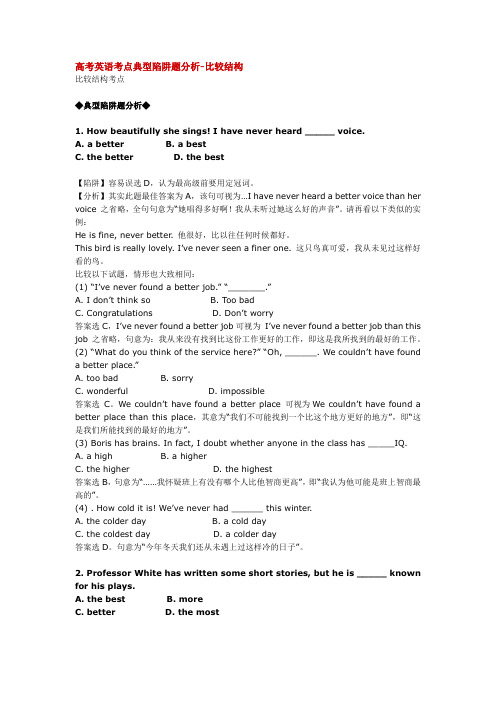
高考英语考点典型陷阱题分析-比较结构比较结构考点◆典型陷阱题分析◆1. How beautifully she sings! I have never heard _____ voice.A. a betterB. a bestC. the betterD. the best【陷阱】容易误选D,认为最高级前要用定冠词。
【分析】其实此题最佳答案为A,该句可视为…I have never heard a better voice t han her voice 之省略,全句句意为“她唱得多好啊!我从未听过她这么好的声音”。
请再看以下类似的实例:He is fine, never better. 他很好,比以往任何时候都好。
This bird is really lovely. I’ve never seen a finer one. 这只鸟真可爱,我从未见过这样好看的鸟。
比较以下试题,情形也大致相同:(1) “I’ve never found a better job.” “_______.”A. I don’t think soB. Too badC. CongratulationsD. Don’t worry答案选C,I’ve never found a better job可视为I’ve never found a better job than this job 之省略,句意为:我从来没有找到比这份工作更好的工作,即这是我所找到的最好的工作。
(2) “What do you think of the service here?” “Oh, ______. We couldn’t have founda better place.”A. too badB. sorryC. wonderfulD. impossible答案选C。
We couldn’t have found a better place 可视为We couldn’t have found a better place than this place,其意为“我们不可能找到一个比这个地方更好的地方”,即“这是我们所能找到的最好的地方”。
广东省广州市广雅中学高考英语 比较结构陷阱题
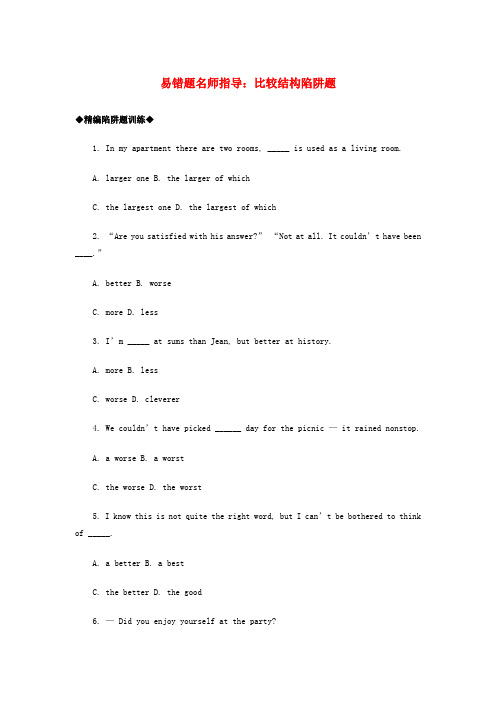
易错题名师指导:比较结构陷阱题◆精编陷阱题训练◆1. In my apartment there are two rooms, _____ is used as a living room.A. larger oneB. the larger of whichC. the largest oneD. the largest of which2. “Are you satisfied with his answer?”“Not at all. It couldn’t have been ____.”A. betterB. worseC. moreD. less3. I’m _____ at sums than Jean, but better at history.A. moreB. lessC. worseD. cleverer4. We couldn’t have picked ______ day for the picnic — it rained nonstop.A. a worseB. a worstC. the worseD. the worst5. I know this is not quite the right word, but I can’t be bothered to think of _____.A. a betterB. a bestC. the betterD. the good6. — Did you enjoy yourself at the party?—Sorry to say I didn’t. It was ______ a meeting than a party.A. more likeB. quite likeC. less likeD. more or less7. When they arrived at the school it was raining _______ harder.A. moreB. quiteC. very D even8. With the development of the Internet, _______ communication is done by regular mail.A. lessB. moreC. littleD. few9. — If you don’t like the red coat, take the blue one.— OK, but do you have ______ size in blue? This one’s a bit tight for me.A. a bigB. a biggerC. the bigD. the bigger10. If there were no examinations, we should have ______ at school.A. the happiest timeB. a more happier timeC. much happiest timeD. a much happier time11. This dress is prettier, but it costs ______ that one.A. twice more thanB. twice as much asC. as much twice asD. twice so much as【答案与解析】1. 选B,由于是两个房间,即是两者比较,故宜用比较级,因此排除C和D;又由于两句之间没有连词,故不宜选A。
高考英语易错题、陷阱题汇编(附详细解析)
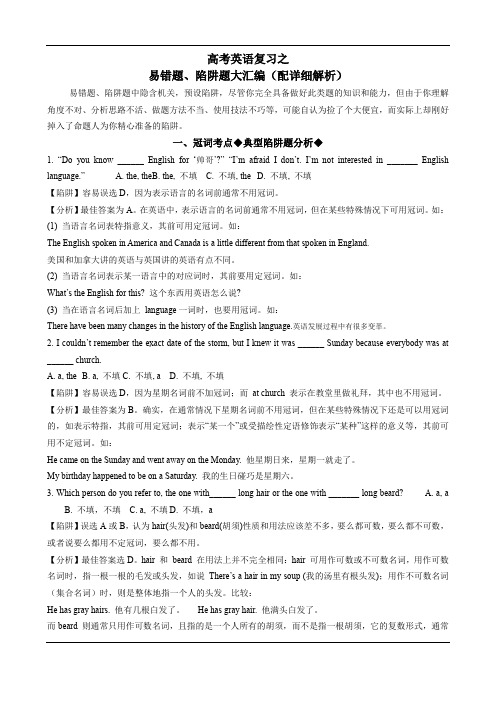
高考英语复习之易错题、陷阱题大汇编(配详细解析)易错题、陷阱题中隐含机关,预设陷阱,尽管你完全具备做好此类题的知识和能力,但由于你理解角度不对、分析思路不活、做题方法不当、使用技法不巧等,可能自认为捡了个大便宜,而实际上却刚好掉入了命题人为你精心准备的陷阱。
一、冠词考点◆典型陷阱题分析◆1. “Do you know ______ English for ‘帅哥’?” “I’m afraid I don’t. I’m not interested in _______ English language.” A. the, the B. the, 不填 C. 不填, the D. 不填, 不填【陷阱】容易误选D,因为表示语言的名词前通常不用冠词。
【分析】最佳答案为A。
在英语中,表示语言的名词前通常不用冠词,但在某些特殊情况下可用冠词。
如:(1) 当语言名词表特指意义,其前可用定冠词。
如:The English spoken in America and Canada is a little different from that spoken in England.美国和加拿大讲的英语与英国讲的英语有点不同。
(2) 当语言名词表示某一语言中的对应词时,其前要用定冠词。
如:What’s the English for this? 这个东西用英语怎么说?(3) 当在语言名词后加上language一词时,也要用冠词。
如:There have been many changes in the history of the English language.英语发展过程中有很多变革。
2. I couldn’t remember the exact date of the storm, but I knew it was ______ Sunday because everybody was at ______ church.A. a, theB. a, 不填C. 不填, aD. 不填, 不填【陷阱】容易误选D,因为星期名词前不加冠词;而at church 表示在教堂里做礼拜,其中也不用冠词。
- 1、下载文档前请自行甄别文档内容的完整性,平台不提供额外的编辑、内容补充、找答案等附加服务。
- 2、"仅部分预览"的文档,不可在线预览部分如存在完整性等问题,可反馈申请退款(可完整预览的文档不适用该条件!)。
- 3、如文档侵犯您的权益,请联系客服反馈,我们会尽快为您处理(人工客服工作时间:9:00-18:30)。
典型高考英语陷阱题详解·比较结构
1. How beautifully she sings! I have never heard _____ voice.
A. a better
B. a best
C. the better
D. the best
【陷阱】容易误选D,认为最高级前要用定冠词。
【分析】其实此题最佳答案为A,该句可视为...I have never heard a better voice than her voice 之省略,全句句意为"她唱得多好啊!我从未听过她这么好的声音"。
请再看以下类似的实例:
He is fine, never better. 他很好,比以往任何时候都好。
This bird is really lovely. I've never seen a finer one. 这只鸟真可爱,我从未见过这样好看的鸟。
比较以下试题,情形也大致相同:
(1) "I've never found a better job." "_______."
A. I don't think so
B. Too bad
C. Congratulations
D. Don't worry
答案选C,I've never found a better job可视为I've never found a better job than this job 之省略,句意为:我从来没有找到比这份工作更好的工作,即这是我所找到的最好的工作。
(2) "What do you think of the service here?" "Oh, ______. We couldn't have found a better place."
A. too bad
B. sorry
C. wonderful
D. impossible
答案选C。
We couldn't have found a better place 可视为We couldn't have found a better place than this place,其意为"我们不可能找到一个比这个地方更好的地方",即"这是我们所能找到的最好的地方"。
(3) Boris has brains. In fact, I doubt whether anyone in the class has _____ IQ.
A. a high
B. a higher
C. the higher
D. the highest
答案选B,句意为"……我怀疑班上有没有哪个人比他智商更高",即"我认为他可能是班上智商最高的"。
(4) . How cold it is! We've never had ______ this winter.
A. the colder day
B. a cold day
C. the coldest day
D. a colder day
答案选D。
句意为"今年冬天我们还从未遇上过这样冷的日子"。
2. Professor White has written some short stories, but he is _____ known for his plays.
A. the best
B. more
C. better
D. the most
【陷阱】容易误选D。
【分析】此题首先不宜选B或D,因为well known 的比较级和最高级通常是better known和best known,有时也可以是more well known 和most well known,但通常不能是more known 和most known。
至于是选A还是C,这就要看语境。
由于句中涉及的只有stories 和plays 两个对象,故应选比较级。
3. You are _____ careful than your brother. You two can't do the work that needs care and skill.
A. not more
B. no more
C. not less
D. no less
【陷阱】容易误选A。
【分析】要做对此题,首先要正确理解以下结构的含义:
not more ... than = 不如……
no more ... than = 和……一样不(否定两者)
not less ... than = 不如……不(即指不如less 后形容词的反面)
no less ... than = 和……一样(肯定两者)
比较以下各句的意思:
You are more careful than he is. 你比他仔细。
You are not more careful than he is. 你不如他仔细。
You are no more careful than he is. 你和他一样不仔细。
You are less careful than he is. 你不如他仔细(你比他粗心)。
You are not less careful than he is. 你比他仔细(你不如他粗心)。
You are no less careful than he is. 你和他一样仔细。
通过以上分析,再结合句子语境,可知此题最佳答案为B。
4. "Oh, how fat he is!" "But I think he is ____ than fat."
A. short
B. shorter
C. more short
D. shortest
【陷阱】容易误选B。
认为short为单音节形容词,故用-er构成比较级。
【分析】其实正确答案应是C。
要弄清此问题,得先从比较句型的两种不同类型说起:(1) 异类同质比较:即指两个不同的人或事物(异类)在同一方面(同质)进行比较。
如:
My room is smaller than yours. 我的房间比你的小。
Our country is more powerful than theirs. 我们的国家比他们的国家更强大。
(2) 同类异质比较:即指同一个人或事物(同类)在两个不同的方面(异质)进行比较,这类句子常译为"(更多的)是……,而不是"、"与其……不如……"等。
如:
He was more lucky than clever.他是靠运气而不是靠聪明。
She was mare surprised than angry. 她感到更多的是惊讶而不是生气。
This is more a war movie than a western. 这更应当说是一部战争片,而不是西部片。
按英语习惯,在进行同类异质比较时,只能用more构成比较级,不能用-er形式,即使是单音节词也是如此。
